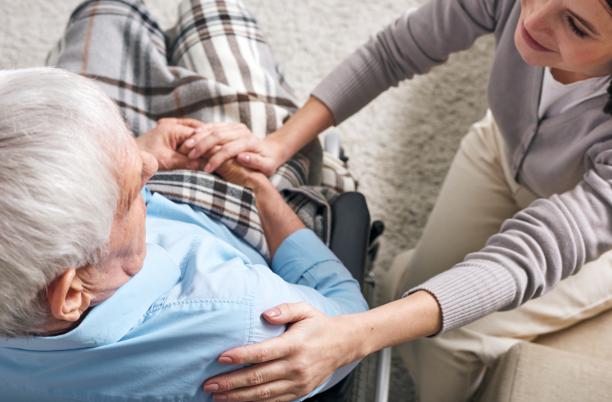
When the person you are caring for dies

When the person you are caring for dies it can be very difficult, because you are coping with their loss as well as a huge change to your day-to-day routine. This page has some advice on how to manage this.
Title
What's on this page
When the person you care for dies
Coping with the loss of the person you have been caring for can be very difficult.
Relationships you have built up with the professionals involved in their care come to an end, and carers often lose contact or see friends and family less frequently because of the demands of their caring role.
Picking up old social contacts might feel difficult or awkward, but it’s worth telling friends and family how you feel and asking for support if you need it. Talking about what has happened and about the person who died can help you to come to terms with their death, and cope with the feelings you have.
You can also try the following:
- The Carers UK Forum is an online community of carers that is free to join, and is available 24 hours a day, every day of the year. Here you can share your experiences with other carers and ask for advice.
Our information pages contain guides on how to manage feelings of grief:
- Coping with grief tells you more about how you might feel when some close to you dies and how to manage your feelings
- Where to get bereavement support has information about who you can speak to if you need professional advice and support
What you need to do
If you were the main carer of the person who has died there are likely to be a number of practical things to do, such as register the death, arrange the funeral, and sort out their property and possessions. For guidance visit our information pages:
Your personal circumstances
Your own situation may change, such as benefits you can claim and your living circumstances.
If you were receiving Carer’s Allowance this will usually continue for eight weeks after the person has died, so long as certain criteria continue to be met.
Other means-tested benefits might also continue for up to eight weeks, and in some circumstances Universal Credit payments can continue after a person died.
For more information about what benefits you might be entitled to, as well as housing advice, visit the Carer’s UK website.
Life after caring
When caring ends, some practical matters will have to be dealt with fairly quickly, for example, benefits and housing, but you don’t need to rush into making decisions about what to do next straight away.
The end of your caring role may take some time to adjust to. Having more time to yourself may give you the opportunity for a much needed rest, but it can also leave you with a lot of time to fill.
If you are used to always having things to do, it can be hard to stop and think about what you would like to do, and to be able to make choices for yourself. Some carers find that once they are no longer caring, exhaustion – both physical and emotional – catches up with them and they feel unwell for a while.
Having spent time caring for someone else and putting their needs first, it is really important to look after yourself and let other people look after you.
If you have lost touch with people, you could try finding out what help or services your local carers’ centre or group offers to former carers. You could try the following:
- Volunteer if you have time to spare. This can be a very social activity, and can be a good way to meet new people. However some places require a period of time to elapse before bereaved people can volunteer with them.
- Learn something new. You may feel that you would like to refresh skills that you have not used for a while, or learn something completely new. You might have gained new skills or interests from your caring role that you also want to pursue. Taking a course can also be a great way to meet new people. Visit your local library or contact adult education centres to find out what is available.
- Return to work. If you had given up work (or not worked at all) because of your caring responsibilities, you may want to return to work once your caring role ends. Contact National Careers Advice on 0800 100 900 if you’d like to discuss possible careers with an adviser, or your local Jobcentre Plus.



